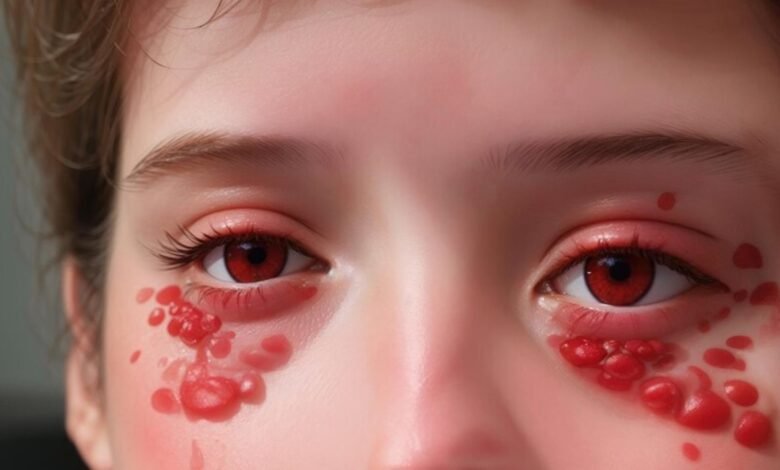What is the most Common Eye Infection?

When it comes to eye health, we often take our eyes for granted. However, eye infections are more common than you might think, and they can range from mild irritations to serious conditions that require immediate attention. In this article, we will explore the most common eye infections, their causes, symptoms, and treatment options. Let’s dive into the world of eye health and discover how to protect our precious sense of sight.
Understanding Eye Infections
Eye infections can affect various parts of the eye, including the eyelids, conjunctiva, cornea, and even the interior of the eye. These infections can be caused by bacteria, viruses, fungi, or other microorganisms. Some common factors that can increase the risk of eye infections include poor hygiene, contact lens use, and a weakened immune system.
Types of Common Eye Infections
Conjunctivitis (Pink Eye)
Conjunctivitis, often referred to as pink eye, is one of the most prevalent eye infections. It can be caused by viruses, bacteria, or allergens. Symptoms include redness, itching, discharge, and tearing. The choice of treatment depends on the underlying cause but may include prescription eye drops or ointments. Proper hygiene and isolation are crucial to prevent its spread, especially in contagious cases.
Stye (Hordeolum)
A stye is a painful lump that forms on the eyelid, typically resulting from a blocked gland. It can cause swelling and tenderness in the affected area. Warm compresses applied to the stye can help alleviate discomfort and encourage drainage. Good eyelid hygiene is also recommended to prevent future occurrences.
Read More: The Dangers of Digital Eye Strain and How to Prevent It
Blepharitis
Blepharitis is an inflammation of the eyelids, often caused by bacterial overgrowth. It can manifest as red, itchy, and crusty eyelids. Treatment options may include warm compresses, eyelid scrubs, and antibiotics to control the bacterial infection. Consistent eyelid hygiene is essential for managing and preventing blepharitis.
Keratitis
Keratitis is an infection of the cornea, typically caused by bacteria, viruses, or fungi. Symptoms include eye pain, redness, blurred vision, and heightened sensitivity to light. Prompt medical attention is crucial to prevent complications and potential vision loss. Treatment may involve prescription eye drops or oral medications, depending on the severity and underlying cause of the infection.
Corneal Ulcers
Corneal ulcers are open sores on the cornea, often caused by bacterial, viral, or fungal infections. These ulcers can be painful and may lead to vision impairment if left untreated. Treatment involves antibiotics or antifungal medications and may require close monitoring by an eye specialist.
Endophthalmitis
Endophthalmitis is a severe and potentially sight-threatening infection that affects the interior of the eye, including the vitreous humor. It can occur as a result of eye surgery, trauma, or the spread of infection from other parts of the body. Immediate medical intervention, such as intravenous antibiotics or surgical drainage, is crucial in managing endophthalmitis.
It’s essential to note that the symptoms and severity of eye infections can vary, and self-diagnosis is not recommended. If you suspect you have an eye infection or experience persistent eye discomfort or changes in vision, seek professional medical advice promptly. Early detection and appropriate treatment can help preserve your eye health and prevent complications.
Preventing Eye Infections
Prevention is key when it comes to maintaining good eye health and avoiding common eye infections. By following a few simple guidelines and practicing proper hygiene, you can significantly reduce your risk of eye infections. Here are some essential tips for preventing eye infections:
Hand Hygiene
Always wash your hands thoroughly with soap and water before touching your eyes or handling contact lenses. Proper hand hygiene is the first line of defense against transferring harmful microorganisms to your eyes.
Contact Lens Care
If you wear contact lenses, it’s crucial to follow your optometrist’s instructions for proper lens cleaning and disinfection. Use the recommended solution, and avoid using expired products. Remove your lenses before sleeping, unless they are specifically designed for extended wear.
Avoid Touching Your Face
Try to refrain from touching your eyes, nose, and mouth with unwashed hands, especially when you are in public places or after touching potentially contaminated surfaces. This simple habit can help prevent the transfer of germs to your eyes.
Allergen Management
If you have allergies that affect your eyes, such as pollen or dust allergies, take steps to manage them effectively. Use antihistamine eye drops or oral medications as recommended by your healthcare provider. Reducing exposure to allergens can minimize the risk of eye irritation and infections.
Avoid Sharing Eye Makeup
Sharing eye makeup, such as mascara or eyeliner, can introduce bacteria to your eyes. It’s best to avoid sharing makeup products with others to maintain eye health. Replace your eye makeup regularly to prevent bacterial buildup.
Protective Eyewear
When engaging in activities that could expose your eyes to potential hazards, such as woodworking or playing sports, wear protective eyewear. Safety glasses or goggles can shield your eyes from injuries and foreign objects that may cause infections.
Swimming Precautions
If you enjoy swimming, take precautions to protect your eyes. Wear swim goggles to prevent waterborne microorganisms, which can cause infections, from coming into contact with your eyes. Remove contact lenses before swimming to avoid contamination.
Avoid Smoking
Smoking increases the risk of various eye conditions, including cataracts and macular degeneration. Quit smoking or avoid exposure to secondhand smoke to reduce your susceptibility to eye infections and other eye-related health issues.
Regular Eye Exams
Schedule regular eye exams with an optometrist or ophthalmologist. These professionals can detect potential eye infections or conditions in their early stages, allowing for timely treatment and prevention of complications.
By incorporating these preventive measures into your daily routine, you can significantly reduce the risk of common eye infections. Remember that early detection and proper hygiene play vital roles in maintaining optimal eye health. If you suspect you have an eye infection or experience persistent eye discomfort, seek professional medical advice promptly.
Seeking Medical Attention
If you suspect you have an eye infection or experience persistent symptoms, it’s crucial to seek medical attention promptly. Delaying treatment can lead to complications and potential damage to your vision.
Read More: How to Improve Your Eye Health: Tips for Brighter Vision
Conclusion
In conclusion, safeguarding the health of your eyes is of utmost importance. Eye infections, although common, can range from minor irritations to severe conditions that could potentially compromise your vision. To recap, we’ve explored various aspects of eye infections, including their types, causes, symptoms, and prevention strategies.
Understanding the types of common eye infections, such as conjunctivitis, styes, blepharitis, keratitis, corneal ulcers, and endophthalmitis, is essential. Each type presents its own set of challenges and requires specific treatments. If you suspect you have an eye infection, seeking prompt medical attention is crucial to prevent complications and preserve your eye health.
FAQs
1. Can I use over-the-counter eye drops for pink eye?
Over-the-counter eye drops may provide relief for mild cases of pink eye caused by allergies. However, bacterial or viral conjunctivitis requires prescription medication.
2. Is it safe to share eye makeup with friends?
Sharing eye makeup can introduce bacteria to your eyes, increasing the risk of infections. It’s best to avoid sharing makeup products to maintain eye health.
3. How can I soothe eye discomfort at home?
You can use a warm compress to relieve discomfort from conditions like styes or blepharitis. However, consult a healthcare professional for proper diagnosis and treatment.
4. Can contact lenses cause eye infections?
Yes, improper use or hygiene of contact lenses can lead to eye infections. Follow your optometrist’s instructions for safe contact lens wear.
5. Are eye infections contagious?
Yes, some eye infections, such as conjunctivitis, can be highly contagious. It’s important to practice good hygiene to prevent the spread of infection to others.







